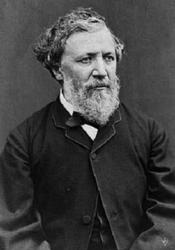Robert Browning (1812-1889) [HISTORICAL] (Chapter 4 pp. 278)
Robert Browning is revered as one of the most important English poets of the Victorian period. He is best known for dramatic monologues like "Porphyria's Lover" (1836) and "My Last Duchess" (1842); he also produced the psycho-historical epic The Ring and the Book (1868-1869) which contains 21,000 lines written in verse. Browning’s rhyme patterns and light verse seem suitable for children’s poems; however, Browning's poems contain adult themes which critics deem unsuitable for children. Browning's themes are mainly concerned with philosophical and religious questions.
In Virgina Woolf's Orlando: An Autobiography (1928), Orlando and Nicolas Greene meet long after their previous encounter in Malmsey. Once again, Orlando and Greene talk about the literary "giants" and "heroes" (278). Greene claims "the great days of literature are over" because the giants and heros have been replaced with "Tennyson, Browning, [and] Carlyle!" (Woolf 278). In this instance, readers can tangibly see the change in Orlando; although "[a] violent tumult of emotion besieged her at meeting the man who had caused her, years ago, so much pain," she remains critically aware that Greene said "the very same things three hundred years ago" (Woolf 278). She notes: "literature has been a prosperous pursuit [...] but somehow the old restless, uneasy vivacity had gone" (Woolf 279). Patrick Collier in his article, "Virginia Woolf in the Pay of Booksellers: Commerce, Privacy, Professionalism, 'Orlando,'" analyzes tensions within the literary marketplace, which Orlando identifies in her conversation with Greene. Collier highlights the tension between "the urge to decry the institutions of the literary marketplace and the need to master and manipulate those institutions, for prestige and cultural capital if not for popularity per se—between the writer's wish to be heard and her desire to remain true to her artistic ambition" (363). The interchangeability of literary heroes in Orlando expresses the wish to "refine language into an instrument so efficient, capable of conveying such a dense load of meaning, that it can be understood only by the writer herself and a few select others" (Collier 363).
Woolf, Virginia. Orlando: A Biography. Harcourt Brace Jovanovich, 1992.
Collier, Patrick. “Virginia Woolf in the Pay of Booksellers: Commerce, Privacy, Professionalism, ‘Orlando.’” Twentieth Century Literature, vol. 48, no. 4, 2002, p. 363., doi:10.2307/3176040.

